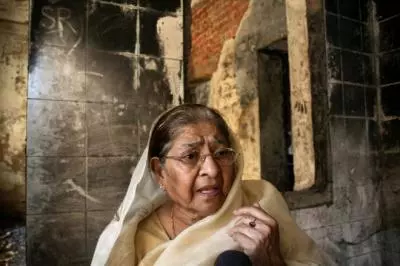
When justice fades away, Zakia Jafri is a beacon of hope
text_fieldsIt was a long battle for the 82-year-old Zakia Jafri. She did not bow down, nor has she shown any tiredness in the course of the legal battle for twenty years.
Her only driving force was the justice for the victims and survivors of the Gulberg society massacre during the 2002 Gujarat riot, in which 69 people were killed, including her husband, former MP and Congress leader, Ehsan Jafri.
Zakia Jafri was one of the prime witnesses and survivors of the massacre which happened on the dreadful night of February 28, 2002. When the people associated with the right-wing group went berserk in the state, looting, pillaging, killing and molesting women and girls belonging to Muslim community after the Godhra incident, it was evident for the people living the Gulberg society that they were no longer safe in their homes.
They never thought that their neighbours for a long time would turn against them. The insecurity, coupled with reports of the killing spree happening across the state, made the members of the society seek asylum in Jafri's house for the sake of their life. They believed his house was safe for them, since he was an MP and a senior Congress leader, indeed a respected one.
What they barely doubted was that Jafri's words would be turned down when he called up the authorities for help and protection. But this time the case was different. The people who lived adjacent to his house converged in his house when the mob reached them. The fact was that the mob was after them, up to Jafri's house.
Though Jafri was a well-known person, the mob could care little for his stature but only the name, and the incidents that followed later vindicated that no matter what stature you had, if you are belonging to a minority community, you are nothing but dust in the country.
Jafri was said to have rung many people who were in power at the time in vain, when the mob began to build up its strength with a vigour for extermination of the people who sought asylumin his house. Among Jafri's call list was the then Chief Minister of Gujarat, Narendra Modi.
Zakia Jafri was with him when he made the frantic calls to the CM for help. The outcome of the call was one of the crucial proofs for a case against the later Prime Minister Narendra Modi, but of which he has now been completely cleared by the Supreme Court.
When the calls Jafri made bore little help at the terrible hours of the night, it ended up with the death of 69 people, including children and many others from suffering the attacks.
Many burned to death, some died of being hacked and others succumbed to lynching and the women and girls were molested, and raped, leaving the survivors to live a life with the horror.
It is true that there was a heinous crime committed, and it is as clear as daylight. It was also true that they had a mob behind it. Now the case has been closed for the brutality and no justice for the people who were butchered.
For Zakia Jafri, her two decades' legal fight was not politically motivated, but was the result of what she had witnessed on the terrific night. She heard the responses to the desperate calls her husband made when death was waiting outside their house. She saw the horror when the calls fell on deaf ears. It was obvious that no sane person could sleep after going through the terror. It is what led her to be steadfast these years, seeking justice, moving from one court to another.
"Deeply disappointing," was the first response of Tanveer Jafri, the son of Zakia Jafri. He was handling the legal procedures on behalf of his 82-year-old mother, who is suffering from hearing impairment and could not stand or walk for extended periods.
A bench presided over by Justice A M Khanwilkar upheld the decision of the Ahmedabad Metropolitan Magistrate to accept the closure report of the Special Investigation Team (SIT), which was appointed by the top court — rejecting the protest petition filed by Zakia.
The SIT formed by the Supreme Court had submitted a closure report in 2012 giving a clean chit to then chief minister Narendra Modi after a preliminary investigation into the complaint filed by Zakia against Modi and 63 others including bureaucrats and policemen. The apex court said there was no prosecutable evidence against them.























